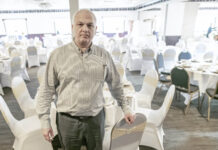The terms of the chef’s trade have made their way into the general language. These days, expressions and words such as “knife skills,” “plating,” and “front-of-the-house” are likely to be tossed into conversations as readily as sriracha sauce on a dish.
The next new additions to the lexicon from the kitchen just may be “demo the primal,” or “break down the loin.” These are terms of the butchery trade and chefs as well as the likes of hunters and fishermen are learning and using this somewhat endangered practice.
The preparation of meat to be cooked and eaten – referred to as “dressing” the meat – has been outsourced over the past few decades by those who raise and sell meat. As a chef from Washington state recently pointed out in an article in an online trade publication, “It’s hard to get specifically what you want that way.” At least two local chefs feel the same way. They are part of a movement where food artisans are discovering the purpose and use of each cut of meat and seafood, thus adding to their work becoming a craft.
Champe Speidel, chef and owner, with wife, Lisa, of Persimmon Restaurant in Bristol and Persimmon Provisions butcher shop in Barrington, learned the butcher’s trade before he learned how to be a chef. He started working in a butcher shop in Florida to earn money for college, where he was studying political science.
A change in vision and a transfer to Johnson & Wales University came later, but he had become an accomplished meat cutter. Today all meats served in Speidel’s restaurant have been prepared at Speidel’s butcher shop with the vast majority personally cut by the chef himself. The craftsmanship dovetails with the “farm to fork” movement that has created almost a cult following among foodies finding their way to the tiny bistro on State Street, just half a block from Bristol Harbor.
Responsibly raised meats sourced from small-scale, sustainable farms is the mission of Persimmon Provisions. Speidel described the numerous cuts he creates from New England farm-raised lamb. His rule of thumb is to keep his sources within a 100- to 150-mile radius of Bristol whenever possible. His attention to quality has other benefits. The chef is a three-time semifinalist for the James Beard Foundation Award of Best Chef: Northeast.
In addition, Persimmon is in the running this year as a semifinalist for a separate award for outstanding service.
One town over, Lou Perella is readying his spring charcuterie at Perella’s Ristorante in Warren. Defined as cooked-meat foods such as sausages and hams, in particular the specially prepared rustic varieties such as prosciutto and coppa, charcuterie is a buzzword among chefs and foodies alike.
Perella, after returning from a visit to Italy, wanted to learn the art of preparing the popular artisan meats that are the signature of Italian locales such as Parma. Perella’s son, who is also an accomplished chef now cooking in Austin, Texas, graduated from Culinary Institute of America with a chef and restaurateur from Maine named Melissa Kelly, whose restaurant Primo is a dining destination in that state’s midcoast region. Primo specializes in house-cured charcuterie.
The two Perellas visited Primo last fall and, as Lou related on my radio show, spent a week making prosciutto and spicy coppa that spent the winter aging in Perella’s restaurant in Rhode Island.
The response both chefs have received so far makes it clear that there is plenty of demand for what they have set out to do. Anytime one forges his or her own path, there are choices and decisions to be made, both personal and business. For example, Speidel has chosen not to do charcuterie, focusing on whole cuts of beef, pork, lamb and poultry. He and his crew at Persimmon Provisions are meat-centric. The art of seafood butchering is a somewhat different specialty. As for sharing their knowledge, both Speidel and Perella have been approached to conduct classes in their respective skills and are considering how that might be accomplished. One thing is fairly certain if such opportunities are offered – vegans and vegetarians will be welcome.
For now, Speidel’s mission is twofold: to create a workshop for the restaurant and ensuring he is serving the best product he can source for his guests, and to offer passionate cooks in town a chef-owned butcher shop. Perella is following in the footsteps of his heritage while at the same time seizing on an opportunity to take a culinary journey with his son. In both instances, we who dine out often can benefit from their artisanship.
About those terms: “demo the primal” means to showcase the prime cuts, while to “break down” a whole tenderloin or any other main part such as a leg or shoulder is to cut it into steaks, chops or filets. •
Bruce Newbury’s “Dining Out” food and wine talk radio show is heard on WADK-AM 1540, WHJJ-AM 920, WBLQ-AM 1230, online and through mobile applications. He can be reached by email at bruce@brucenewbury.com.












